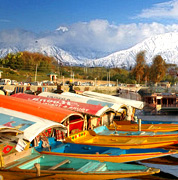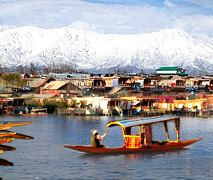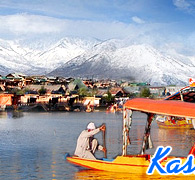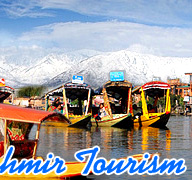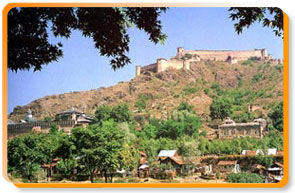 The Mughal fort situated on the banks of the Dal Lake
of Srinagar, it is positioned on top of the Sharika Hill. Originally, it
was built during the reign of Akbar but its present structure owes
itself to the Afghan governor of Kashmir in the 18th century. It has a
Parvati temple on the western slope and the Muslim shrines of Khwaja
Makhdoom Sahib and Akhund Mullah Shah on the southern one. On the
southern side of the outer wall there is a Guru Dwara, which
commemorates the visit of Guru Hargobind Singh. Presently the fort is
under army occupation. According to the local legend, this hill was once
a lake as large as a sea and was inhabited by the abominable demon known
as Jalobhava. The inhabitants called on Goddess Sati, spouse of Lord
Shiva for her help. She took the form of a bird and dropped a pebble on
the demon's head, which kept on increasing in size until the demon was
crushed by it. Hari Parbat is revered as that pebble and it is said to
have become the home for all 33 crore gods of the Hindu pantheon.
The Mughal fort situated on the banks of the Dal Lake
of Srinagar, it is positioned on top of the Sharika Hill. Originally, it
was built during the reign of Akbar but its present structure owes
itself to the Afghan governor of Kashmir in the 18th century. It has a
Parvati temple on the western slope and the Muslim shrines of Khwaja
Makhdoom Sahib and Akhund Mullah Shah on the southern one. On the
southern side of the outer wall there is a Guru Dwara, which
commemorates the visit of Guru Hargobind Singh. Presently the fort is
under army occupation. According to the local legend, this hill was once
a lake as large as a sea and was inhabited by the abominable demon known
as Jalobhava. The inhabitants called on Goddess Sati, spouse of Lord
Shiva for her help. She took the form of a bird and dropped a pebble on
the demon's head, which kept on increasing in size until the demon was
crushed by it. Hari Parbat is revered as that pebble and it is said to
have become the home for all 33 crore gods of the Hindu pantheon.Another version of the myth that involves the hill, says that two demons, Tsand and Mond occupied the fair valley. Tsand conceded himself in water near the present location of Hari Parbat and Mond somewhere above the present Dal Gate. They were a menace to the people of the valley, which could not be inhabited owing to their dreaded presence. Thus, the gods invoked Goddess Parvati who assumed the form of a Hor (myna) and flew to Sumer from where she got a pebble in her beak and threw it on the demon Tsand to crush him. The pebble grew into a mountain. She is worshipped as Sharika in Shri Tsakra (an emblem of cosmic energy pervading the universe) occupying the middle part of the western slope of the hill. The hill is also called Predemna Peet or Kohi Maran. Akbar the Great built the outer wall of the fort in 1590 at a cost of one crore and ten lakh of rupees. The inscription in Persian at the Kathi Darwaza commemorating this work can be read even today. Akbar intended to lay the foundation of a new capital inside the fort and call it Nagar Nagor. The ruins of certain terraces can still be seen on the side of the Pokhiri Bal. The views of the Dal lake and a part of the valley from the fort are spectacular.




